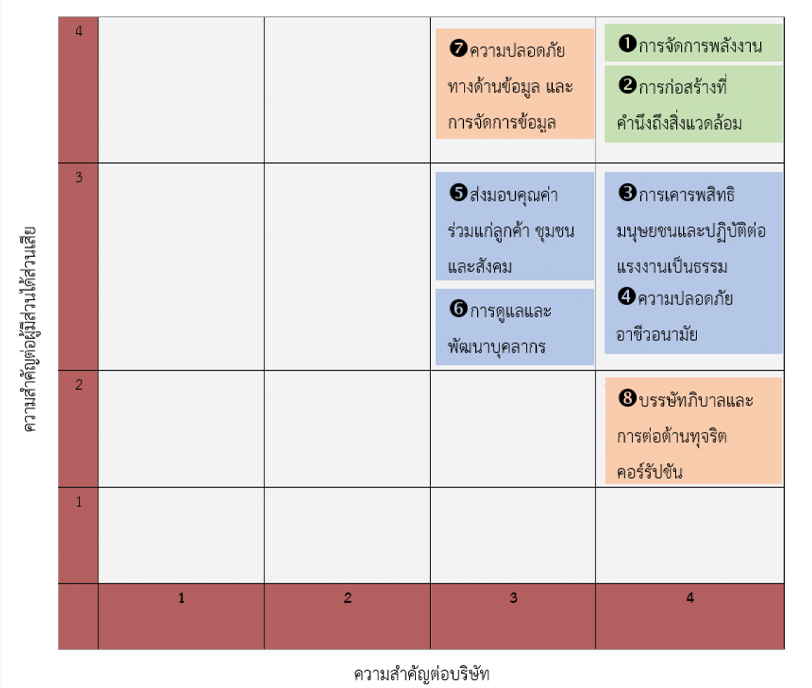
Britania Public Company Limited and its subsidiaries conduct business under the framework of good governance in accordance with the sustainable development guidelines of the Stock Exchange of Thailand. The Company has the commitment to development business along with balancing the economy, society, and the environment. The Company is also committed to continuing to be a good corporate citizen in terms of conducting business sustainably, managing the business in such a way that it can grow steadily and be accepted in society while adhering to ethical and good corporate governance principles, as well as effectively generating returns for shareholders, while taking into account the impact of business operations on all stakeholders in all aspects, covering all 3 dimensions (ESG): the environment, social, and Corporate governance and economy under the concept of Growth together sustainably.
Britania believes what's more than building a residence is to create a living that is friendly to the surrounding society and the environment to be a sustainable quality society. Therefore, the idea of carrying out social activities was born. In order to make it possible, we must start from training employees, known as B CRAFTER, to be responsible for society and the environment by using BRI HEARTMADE's core driving force which is social and environmental responsibility and taking sincere action not only for yourself but also for the betterment of the residents. Take into account the importance of the Company’s stakeholders (customers, partners, shareholders, agencies) with understanding and care, which will make the Company grow far, continually and steadily.
- Conducting Business with Fairness
Set guidelines for taking care of stakeholders in the business ethics. Promote free and fair-trade competition. Avoid activities that may cause conflicts of interest and infringement of intellectual property, including combating all forms of corruption.
- Anti-corruption
Conduct business with transparency and recognize the importance of anti-corruption in all forms. Therefore, the Anti-Corruption Policy has been established to be a practical guideline to prevent and combat corruption clearly.
- Respect for Human Rights
Take into account equal equality and freedom. No violation of fundamental rights and discrimination in terms of race, nationality, religion, language, skin color, gender, age, education, physical condition or social status, including taking care to prevent the Company's business and its subsidiaries from being directly and indirectly involved in the violation of human rights.
- Fair Treatment of Employees
Recognize the importance of human resource development and treat employees fairly. Emphasize on respecting the rights of employees according to human rights principles and also allows employees to express their opinions or complaints about unfair treatment.
- Responsibility Towards Customers and Consumers
Treat customers fairly indiscriminately and do not disclose customer information. Commit to customers’ satisfaction and confidence under appropriate safety and technology.
- Environmental Conservation
Emphasize the conservation of natural resources, including reducing Greenhouse Gas by promoting efficient use of resources, being aware of the safety of society, communities, and the environment.
- Community or Society Development Contributions
Support activities and cultivate awareness of social responsibility in a concrete way to be part of driving Thai society towards sustainably social and environmental development.
- Innovation
Encourage innovation at both the work process level in the organization and at the level of collaboration between organizations which means doing things in new ways. Dissemination of innovation is a social responsibility by communicating and disseminating it to stakeholders both directly and indirectly.
The Company has carried out the process of identifying sustainability key issues that internal and external stakeholders are concerned about, and considered external and internal factors related to business operations, including risk factors, and disclosed operating results according to significant sustainability issues, covering all 3 dimensions: the environment dimension, social dimension, and corporate governance and economic dimension.
Step 1 Identification of relevant sustainability issues
Take into account the expectations of stakeholders, relevant issues in the real estate industry, including emerging risks and major global trends.
Step 2 Prioritizing the key issues
Workshop to discuss with the Sustainability and Environment Working Group, including considering the results of opinion surveys and the issues that stakeholders pay attention to.
Step 3 Verification of key issues
Present sustainability key issues to corporate leaders/Corporate Governance and Sustainability Committees for consideration and approval in line with the context, goals and strategies of the Company.
Step 4 Continuous development
Continuously review the disclosures in the Integrated Sustainability Report, as well as collecting opinions and suggestions from relevant stakeholders
The 8 key sustainability issues

In 2022, the Company has 7 important sustainable development issues as detailed in the following table.
| Sustainability Dimension | Key issues | Impact/Importance | Strategy | SDGs | GRI |
|---|---|---|---|---|---|
| Environmental Dimension | 1. Greenhouse gas management | The impact on reputation is in line with the trend among consumers who care about the environment. | Driven from the policy level, along with establishing a working group on sustainability and the environment. |  |
|
| Social Dimension | 2. Supervision and Development of Personnel | There is a operational impact because employees play an important role in the development of the organization. | Create a corporate culture for unity and increase potential according to individual suitability. |  |
|
| 3. Respect for Human Rights and Fair Treatment of Workers | Operational impact where business partners are at risk of violating human rights, the Company may need to find new business partners. | Policy compliance and encouraging partners to comply with ethical requirements together. |  |
|
|
| 4. Safety Occupational hygiene | The impact on reputation if there is insecurity in construction. | Defined as a safety measure, especially in construction area before, during and after construction, along with regular monitoring and reporting. |  |
|
|
| 5. Creating an excellent experience for customers | The impact on reputation | Adhere to the 9 heart service principles (BRI HEARTMADE) |  |
|
|
| 6. Creating a quality society for the community and society | Pass on the image of the brand. | Emphasis on creating participation for employees, residents, communities and related agencies in operating for social and environmental development. |  |
Local Community (GRI 413-1) | |
| Corporate Governance and Economy | 7. Good Corporate Governance | Reputation impact of transparency in operations | Conduct business with transparency and in a verifiable manner according to the principles of business ethics and complies with the criteria of CGR by the Thai Institute of Directors. |  |
|

